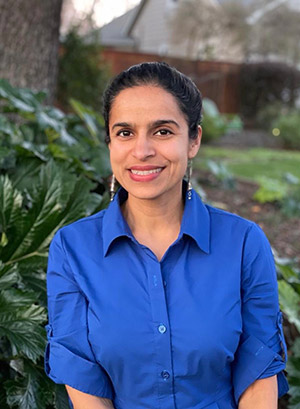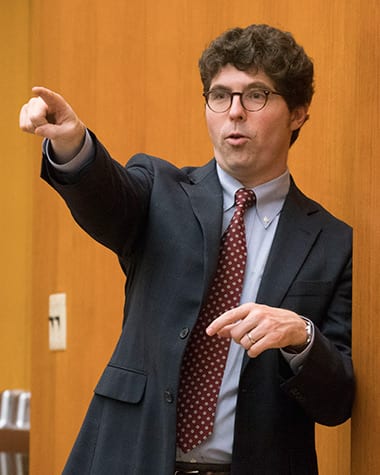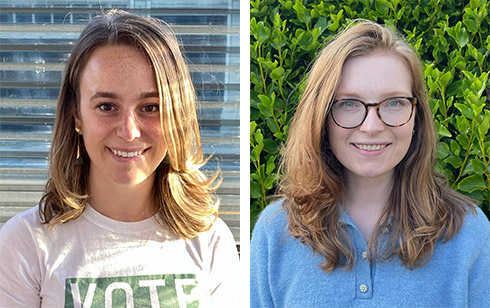By Andrew Cohen
Dean Erwin Chemerinsky cites Berkeley Law’s core pillars as excellence, community, and public mission. Recently, all three shined through in a pro bono collaboration that brought hope to an abused client and progress to California law.

Alumna Mallika Kaur ’10, of counsel at the victim’s rights firm ADZ Law, contacted Professor Andrew Bradt last spring regarding a civil case filed in Napa County Superior Court on behalf of a domestic violence victim against her then-partner. Both are from Georgia, and during a trip to California the defendant is accused of acts including strangulation and rape. Although that led to criminal charges filed against him in California, the court ruled that it lacked personal jurisdiction in the plaintiff’s case for civil damages.
Kaur — a Berkeley Law lecturer who teaches the course Negotiating Trauma, Emotions & the Practice of Law and will teach a Domestic Law seminar next fall — didn’t know Bradt. But she reached out because some of her students had taken his Civil Procedure class.
“I was immediately excited because I thought the ruling was erroneous and I thought California law needed elaboration here,” Bradt says. “So I offered to help however I could.”
He wound up advising on the case, and wrote an amicus brief for the plaintiff’s appeal with the help of student research assistants Jessica Cuddihy ’21 and Natasha Geiling ’21, both of whom had taken his courses in Civil Procedure and Conflict of Laws.
Their brief argued that if someone comes to California, intentionally commits a tort, and causes harm in the state, that person should have to answer for such harm in the state’s courts — even if the visit was short. The California Court of Appeals agreed, reversing the lower court’s decision and remanding the case for further proceedings.
“Who better to bolster and elucidate on the personal jurisdiction issues than Andrew, an expert who has written two casebooks on civil procedure?” Kaur says. “He immediately brought an interest in helping correct the trial court’s hasty and erroneous analysis. I don’t know how he found time for this during pandemic teaching, but I know a lot of people who are deeply grateful that he did.
“This case importantly clarifies the law for many survivors of domestic violence, who may choose to employ the civil legal system given the various complications and even disempowerment they feel in the criminal system.”
Student reunion
For Geiling, joining the case effort with Cuddihy brought her law school experience full circle. “Jess is literally the first person I met at Berkeley Law,” Geiling says. “She was standing behind me in line for bagels before the first day of orientation and became one of my closest friends.”

For Bradt, a former litigator who received Berkeley Law’s 2019 Rutter Award for Teaching Distinction, enlisting Geiling and Cuddihy was a no-brainer.
“I knew they were experts on the issues and could dig into both California and federal law with nuance and detail,” he says. “Plus, they served as spectacular collaborators because we could discuss strategies and ideas on a level I’d expect from fellow professional proceduralists.”
While the plaintiff’s merits brief focused on the case details, the amicus brief offered a high-level view of the reasons for constitutional limits on personal jurisdiction that the U.S. Supreme Court has explained in its recent case law — and why those limits didn’t apply here, particularly those related to concepts of interstate federalism.
Expounding on nearly eight decades of rulings around the personal jurisdiction test established by the Supreme Court in the renowned International Shoe case, the authors argued that the plaintiff’s case undoubtedly established the required contacts between the defendant and California. In doing so, they explained why the trial court’s perfunctory analysis did not pass muster under the Supreme Court’s guidelines.
Poring over California case law, Geiling and Cuddihy tracked the differences and similarities in how personal jurisdiction is handled in the states versus federal court. They worked closely in refining their arguments with Bradt and Kaur.
“As a former journalist constantly on the lookout for interesting and challenging writing projects, I’d always wanted to help a professor write an amicus brief,” Geiling says. “Personal jurisdiction is both a fundamental and complex topic of civil procedure, something that we study as first years but go back to even in more advanced classes. So the research was both familiar and challenging.”
The big picture
Bradt knows that for many students, Civil Procedure — a staple of the 1L curriculum — can seem detached from substantive case work and justice. Conveying “the power of procedure” is an ongoing priority in his teaching.

“Every case is a procedure case, and mastery of procedure can often be the difference between winning and losing, regardless of the case’s merits,” says Bradt, the faculty director of Berkeley Law’s Civil Justice Research Initiative. “All of our procedure faculty discuss high-level issues of legal policy and history, but we also remember that civil procedure is often where the rubber meets the road … Our students get that too, and it’s part of why working with them is such a pleasure.”
California was the first state to recognize a unique tort of domestic violence; in most other states, someone can pursue money damages in a civil case against an intimate partner only through general assault and battery claims. In addition, California has abolished interspousal tort immunities for negligent and intentional torts.
In this case, Kaur explains, the defendant relied on a dearth of direct case law specifically stating that a non-resident plaintiff can argue specific jurisdiction against a non-resident defendant to pursue California’s domestic violence tort.
“Given the interstate and interconnected nature of our lives today — coupled with the continuing and vicious reality of intimate partner violence and its pervasiveness across the country — we knew the lack of clear case law would be a blow to many future victim-survivors of violence seeking civil remedies,” she says.
When the case goes back to trial court, it will start from the beginning — which means a likely timeline of at least nine months. Nevertheless, Kaur says the plaintiff told her ADZ Law attorneys, even before she won the appeal, “that she felt a deep sense of vindication just knowing how various experts stepped up to support her pro bono.”
Cuddihy is currently clerking at the U.S. Court of Appeals for the Ninth Circuit in Seattle. Geiling, a law clerk with the Alameda County Counsel’s office, will clerk next year for federal judge Karin Immergut ’87 in Portland. For Bradt, working with them and Kaur reinforced the school’s foundation.
“This collaboration between an alum who practices and teaches here, a full-time faculty member, and our excellent students really represents the best of Berkeley and its public mission,” he says. “This is one case, but it makes a real difference for a real person and also led to a published opinion that moves the law in the right direction in our state. It’s just a great example of what our community, and the rule of law, can accomplish.”